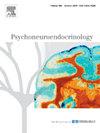Contextual memory bias in emotional events: Neurobiological correlates and depression risk
IF 3.4
2区 医学
Q2 ENDOCRINOLOGY & METABOLISM
引用次数: 0
Abstract
Background
Contextual memory loss of emotional events plays a critical role in depression psychopathology. Individuals with depression, clinical or subclinical, exhibit enhanced and impaired memory for emotionally negative stimuli and context in an event, respectively. This suggests that contextual encoding may fail because of attentional interference caused by concurrent negative stimuli, possibly leading to contextual memory loss as a depression risk. Amygdala–prefrontal connectivity and cortisol may underlie the mechanism; however, the relationships remain unknown.
Methods
One hundred twenty participants, including 34 with subclinical depression, underwent behavioral tasks, functional magnetic resonance imaging (fMRI) scans, and saliva collection. Encoding and 24 h later recollection performance of visuoperceptual/spatial/temporal context in a series of events, where fearful (vs. neutral) faces appeared, were measured via contextual memory tasks. Overgeneral autobiographical memory (OGM), a more remote form of contextual memory loss, was also assessed via the Autobiographical Memory Test. Amygdala connectivity was measured by fMRI during attentional interference by fearful (vs. neutral) faces to differentiate selective attention from encoding. Basal cortisol levels were assayed through saliva collected at encoding during the visit day and across 2 consecutive days in the following week (12 time points in total). We explored whether contextual memory encoding failure would explain depressive symptoms through OGM under possible moderation of amygdala connectivity and cortisol.
Results
In individuals with subclinical depression compared to those without, fearful faces disturbed memory encoding of the visuoperceptual context rather than 24 h later recollection, while neutral faces in their temporal proximity contrastingly augmented it. The more the contextual memory encoding bias (fearful vs. neutral) intensified, the more the amygdala’s functional connectivity with the ventromedial prefrontal cortex (vmPFC) weakened. Higher total cortisol output tended to be correlated with poorer 24-h later recollection of the temporal context. Moderated mediation effects of the amygdala-vmPFC connectivity and cortisol were not significant; however, contextual encoding bias explained depressive symptoms through negatively valenced OGM.
Conclusions
Negative stimuli appearing in an event might impair memory encoding of the visuoperceptual context under attentional interference, represented as weakened amygdala-vmPFC connectivity implicated in emotion-related attentional dysregulation. Conversely, negative stimuli might enhance temporally proximal visuoperceptual encoding after their disappearance. Contextual encoding bias could explain the overgeneralization (or lower coherence) of autobiographical memory and increase the risk of depression. The possible role of cortisol in recollecting the context of emotional events over time warrants further investigation.
情绪事件中的情境记忆偏差:神经生物学相关性与抑郁风险。
背景情绪事件的情境记忆缺失在抑郁症精神病理学中起着至关重要的作用。无论是临床抑郁症患者还是亚临床抑郁症患者,他们对情绪负面刺激和事件情境的记忆分别表现出增强和减弱。这表明,情境编码可能会因为同时出现的负面刺激造成的注意力干扰而失效,从而可能导致情境记忆丧失,成为抑郁症的一种风险。杏仁核-前额叶连通性和皮质醇可能是这一机制的基础;然而,其中的关系仍然未知:120名参与者(包括34名亚临床抑郁症患者)接受了行为任务、功能磁共振成像(fMRI)扫描和唾液采集。通过情境记忆任务测量了一系列事件中出现的恐惧(与中性)面孔的视觉感知/空间/时间情境的编码和24小时后的回忆表现。此外,还通过自传体记忆测试对自传体记忆过度(OGM)进行了评估,自传体记忆过度是自传体记忆缺失的一种较远的形式。在注意力受到恐惧(与中性)面孔干扰时,通过 fMRI 测量杏仁核连通性,以区分选择性注意和编码。基础皮质醇水平是通过在访问日编码时和随后一周连续两天(共 12 个时间点)收集的唾液进行测定的。我们探讨了在杏仁核连通性和皮质醇的可能调节下,情境记忆编码失败是否能通过 OGM 解释抑郁症状:亚临床抑郁症患者与非亚临床抑郁症患者相比,恐惧面孔会干扰视知觉情境记忆编码,而不是 24 小时后的回忆,而与其时间相近的中性面孔则会增强视知觉情境记忆编码。上下文记忆编码偏差(恐惧与中性)越大,杏仁核与腹外侧前额叶皮层(vmPFC)的功能连接就越弱。较高的皮质醇总输出量往往与较差的 24 小时后时间背景回忆相关。杏仁核-前额叶皮质连通性和皮质醇的调节中介效应并不显著;然而,情境编码偏差通过负向情感的OGM解释了抑郁症状:结论:事件中出现的负面刺激可能会在注意干扰下损害视觉感知上下文的记忆编码,表现为杏仁核-大脑前区连通性减弱,这与情绪相关的注意失调有关。相反,负面刺激可能会在其消失后增强时间上临近的视知觉编码。情境编码偏差可以解释自传体记忆的过度泛化(或一致性降低),并增加抑郁的风险。皮质醇在随着时间的推移回忆情绪事件的情境中可能扮演的角色值得进一步研究。
本文章由计算机程序翻译,如有差异,请以英文原文为准。
求助全文
约1分钟内获得全文
求助全文
来源期刊

Psychoneuroendocrinology
医学-精神病学
CiteScore
7.40
自引率
8.10%
发文量
268
审稿时长
66 days
期刊介绍:
Psychoneuroendocrinology publishes papers dealing with the interrelated disciplines of psychology, neurobiology, endocrinology, immunology, neurology, and psychiatry, with an emphasis on multidisciplinary studies aiming at integrating these disciplines in terms of either basic research or clinical implications. One of the main goals is to understand how a variety of psychobiological factors interact in the expression of the stress response as it relates to the development and/or maintenance of neuropsychiatric illnesses.
 求助内容:
求助内容: 应助结果提醒方式:
应助结果提醒方式:


